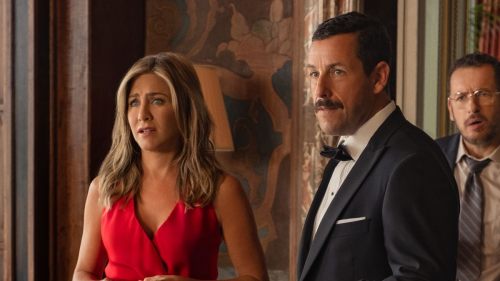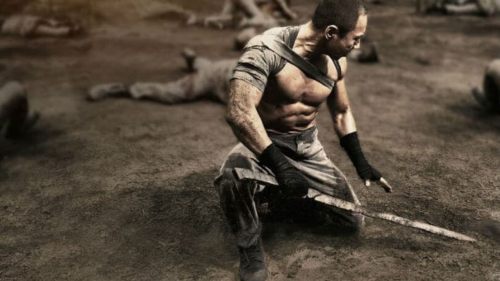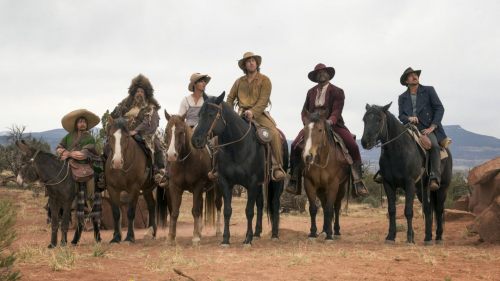DARK And The Concept Of Time Travel
Do you know how to read? I hope so, if you’re staring at this post! You’re going to need it. Netflix’s first foray into original German programming, Dark, means subtitles. (Do NOT put on the English dub. It waters the whole thing down.) If we’re being real, reading what’s happening can only help when you’re taking on a story involving time travel in the same town at…various points in time. (Yes, I’m being vague on purpose. Go with it.)
It’s tough to tell you where the story “begins” because it starts somewhere in the middle. Set in the present-ish of 2019, at least at first, in the small German town of Winden, this dark and completely engrossing tale explores the people in the town and the mysteries of the town itself. Winden has made most of its money from a nuclear power plant in the outskirts, which is slated to be shut down within a year. The building, operation and shutdown of this plant are pivotal to everything that happens in the series.
Among the residents we’re introduced to are the adulterous police officer, Ulrich Nielsen, who’s cheating on his wife and high school sweetheart, Katharina. Who’s he cheating with? It’s kind of trite: the town masseuse, Hannah. I don’t care what this spoils for you, but guys… Hannah is a world-class jerk. There are actual CHILD MURDERERS in this show and I still disliked her the most.
Hannah’s husband, Michael, hung himself earlier in the year and their teenage son, Jonas is still struggling with it. He’s seeing a therapist, Peter Doppler, who’s married to the chief of police, Charlotte, who works with Ulrich, who’s sleeping with Hannah, mother of Jonas, who… you see how intertwined these families are.
While the adults work out their tangled business, the teens of 2019 are exploring the woods near Winden and in particular, one dank, dark cave. Don’t be too impressed with their moxie, though. They’re looking for a bunch of drugs a missing kid named Erik was rumored to have hidden there. To complicate things, Ulrich and Charlotte have been investigating the disappearance of Erik, which is especially eerie for Ulrich, whose own brother disappeared back in 1986 without a trace.
If my explanation is beginning to feel circular, it’s because it is. Baran bo Odar and Jantje Friese, the creators behind Dark, weave past, present, future (and at one point, even FURTHER past) into both a mind-blowing and cohesive loop where the past affects the present affects the future affects the past.
At first blush, you’ll want to compare this series to its Netflix sibling, Stranger Things. You shouldn’t. While not fully off the mark, this doesn’t encompass what Dark is really about. There's no supernatural force affecting a small town. There are no monsters. It isn’t at all nostalgic. It's about the people themselves affecting each other throughout the most natural force of all: time.
The most common approach to time travel seen in film and tv is the idea that, oh no! Something bad/lame has happened in the present and we need to go back in time to prevent it from happening! Look at Back to the Future for your easiest example. Marty lives in the Lame Present, and goes back to the 1950s by accident. Once there, though, he accidentally affects his parents’ meeting and has to right this wrong in order to make sure he and his siblings don’t cease to exist. Thirty years too late for spoiler alerts on this one, but in the end Marty succeeds at getting his parents together and accidentally creates an Awesome Present, where he returns and gets a rad pickup.
This is an alternate timeline approach. You have events A-Z, and if you go back to event G, you have Alternate H-Z to live in. The only flaw in Back to the Future's execution of this concept is that Marty should’ve had an Alternate Marty whose identity he had to take over. (If you’re a student of the gone-too-soon show Fringe, you’ll know all about alternate timelines and multiple versions of people in all the alternate worlds.)
This stands in stark contrast to the “time is a circle feeding into itself” idea that Dark explores. In Dark, time can’t be changed. There’s no alternate timeline where another reality branches off of the current point in time. Everything has already happened. If Marty had already succeeded in getting his parents back together, he wouldn’t be traveling back in time to begin with. He’d be in his rad pickup truck going to the lake.
In Dark, the events of 2019 cause events in 1986 to occur, which by the time the story closes the loop, we learn that 1986 created the 2019 we were introduced to in the first place, and 1953 created 1986 before that. Nothing has been changed, no matter the actions of any of the characters because it can’t be changed. It already is what caused the present to even BE the present. It’s set and decided, and doesn’t matter how many kids Ulrich tries to kill with a big old rock. (Yup, there’s a cheating cop who tries to kill a kid with a rock and I STILL thought Hannah was the worst character.)
The only way that time can be “changed”, is annihilation of what the past WAS. The old circle would no longer exist, or to be more specific, never have existed in the first place! Basically, if there ever WAS a past different from this one, we’d never know it, because our past is now a fixed circle. Is this approach to time right? Is the alternate timelines version right? What say you? I say Dark is an amazing mind bender and deserves a watch. Or ten.
Minds blown yet? Mine is too. Not to worry, though. Dark has already been renewed for another season, and thankfully, they’re looking at a full year from now for its release. Thankfully, because we’re all going to need twelve months of rewatches and charts to wrap our minds around what we saw and where it might go from here.



